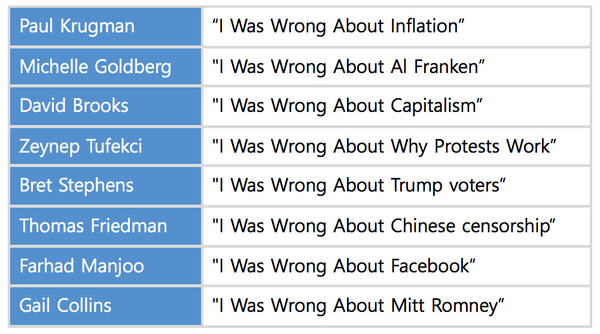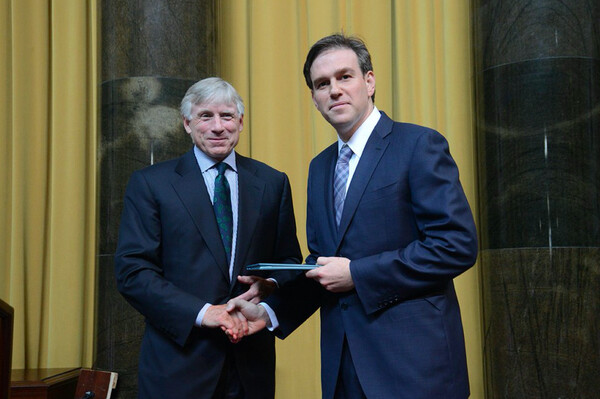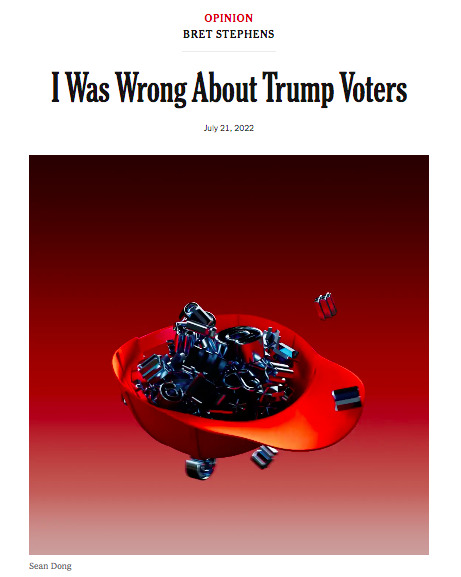The New York Times launched a new project in July 2022. It featured a corner where columnists published articles correcting their previous mistakes on the same date. It was the first time for multiple columnists to publish correction columns simultaneously.
The Times stated, “We hope to become a model of acknowledging mistakes, showing how valuable it is to admit when you get things wrong.”
Paul Krugman, the Nobel Prize-winning economist, admitted that his optimistic prediction about inflation made one year ago was wrong. Thomas Friedman, a three-time Pulitzer Prize winner, acknowledged that his column, which had looked optimistically at China’s censorship policies, was mistaken. And he wrote a new column saying that China had become much more closed off than it was 10 years ago.

The new corner is called ‘I Was Wrong About…’. It was proposed by The Times columnist Bret Stephens. I conducted a written interview with Stephens through 10 email exchanges from January 23 to 28.
Stephens was born in 1973 in New York and grew up in Mexico City. He graduated from the University of Chicago and earned a master’s degree in the London School of Economics.
He began his journalism career in 1995 as an assistant editor at ‘Commentary’ magazine. In 1998, he joined The Wall Street Journal as an op-ed editor. Then he wrote editorials and edited a column about the European Union.
Stephens has a close relationship with the Pulitzer Prize. He was awarded The Pulitzer Prize for Commentary in 2013, while working as an international affairs columnist(2006~2017) for The Wall Street Journal. In 2016 and 2017, he was also a Pulitzer Prize Juror for International Reporting and Editorial Writing, respectively.
Since 2017, he has been a columnist for The Times, writing two articles per week. One focuses on foreign policy or US domestic politics, and the other is a conversation format with his liberal colleague, Gail Collins.

Stephens shared his idea for the ‘I Was Wrong About…’ project with opinion editors of The Times. They liked the idea and persuaded other columnists to participate. Ultimately, Eight out of the 19 columnists participated in the project. Stephens evaluated the project as “an opportunity to reconsider our positions or attitudes.” He also said, “Rethinking our former positions is good for our mind and soul.”
Stephens pointed out that his 2015 column about Trump supporters was wrong. He had written, “If by now you don’t find Donald Trump appalling, you’re appalling,” and he said that was the worst line he ever wrote as a columnist. And he admitted that he had not sufficiently considered the reasons why many people supported Trump. The following is a written interview with Stephens:
- You’ve already written many columns, what made you decide to revisit the topic of Trump voters?
“That column was the most serious intellectual misjudgment I made as a columnist. I still believe that Trump was the worst president in modern U.S. history. However, I didn’t take sufficiently nuanced or sympathetic view of many of his supporters and the reasons they chose to embrace the former president.”
- It’s interesting that your views on Trump supporters have changed. Was there a particular reason for that?
“I had been looking for an opportunity to acknowledge my mistake long before writing the correction column. I had been unfair or inaccurate to Trump voters and had made them too generalized. The ‘I Was Wrong About…’ project seemed like a very good and prominent way to correct my error.”
- The importance of reflecting on one’s own thoughts and ideas was emphasized in the project’s intentions. So, what role should the media play now?
“I wish more of the news media could dedicate itself to providing a broad range of opinion rather than advancing narrow and partisan points of view.”
- As a columnist now, do you think The Times is doing a good job in that role?
“As a conservative at a mostly liberal paper, I’m proud that Times opens its pages to a diversity of opinion and belief.”

The Times is a newspaper that is considered liberal in the United States. But is also known for its conservative columnists. It is an effort to provide readers with diverse perspectives. David Brooks and Bret Stephens are the most prominent figures.
“A drop of honey catches more flies than a gallon of gall.” Stephens quotes Abraham Lincoln’s words at the end of his correction column. And he says, “If you would win a man to your cause, first convince him that you are his sincere friend.”
- You said that it is a word that those who persuade others while quoting Lincoln’s words should remember. Does this mean that columnists and journalists should do like this?
“I think the role of the columnist is to make persuasive arguments that do more than merely reaffirm the views of readers who are already inclined to agree. At their best, columns can help readers who have no opinion, or who disagree with the columnist, to rethink their own positions.”
- When writing a column, what is the most important thing you consider….
“In general, I try to write about the most important stories of the moment where I can add fresh insight or new information. I work hard to make my writing as clear and compelling as possible. And I try to offer intellectually serious arguments that will at least force those who disagree with me to think a little harder about their own views.”
- Mistakes can often occur in writing. What is the most important thing to do to correct them?
“The single most important trait in any good columnist is intellectual honesty. When facts change, or when new information is brought to light, or when errors are discovered, it behooves the columnist to acknowledge these things publicly. Because a columnist gets to write on a regular basis, he has what amounts to a continuous conversation with his readers. That conversation should always include admissions of error or changes of mind and heart.”
- Would you participate again if you were to plan something like ‘I Was Wrong About…’ again?
“If there’s another ‘I Was Wrong About…’ project, I’m sure I could find other errors in my thinking for which I could make public amends.”
- What kind of column would you like to write in the future? I'm curious about your goals.
“I rarely know from week to week what I will write about in the future. The job of the columnist is to stay in the present.”
After the earthquake in Turkey and Syria, Stephens wrote a related column the next day. He criticized the government’s inadequate crisis management abilities by sharing his childhood experience of earthquakes.

